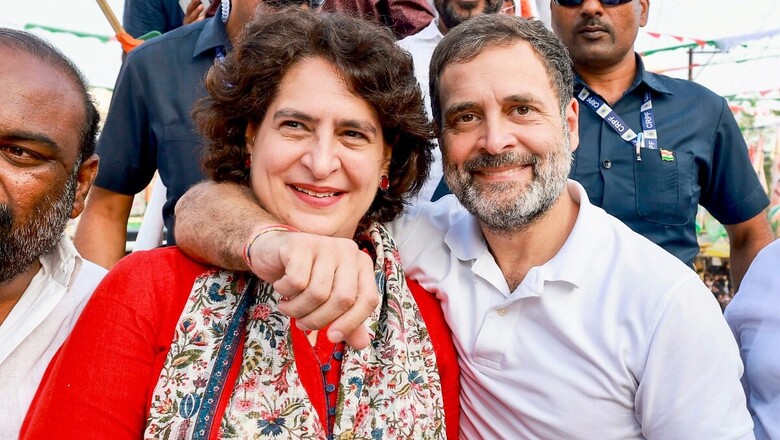
views
In the swirling vortex of the 2024 Lok Sabha elections, the Congress party’s tactical manoeuvres have unfolded like a grand saga of strategic recalibrations. At the heart of this political drama is Rahul Gandhi’s audacious leap from the familiar confines of Amethi to the hallowed grounds of Raebareli, leaving behind a void that echoes with the absence of a Gandhi in the seat of their erstwhile stronghold.
The juxtaposition of Rahul’s Raebareli gambit against the backdrop of Amethi’s Gandhi-less landscape paints a vivid portrait of the party’s intricate dance with electoral destiny. Amethi, once the crown jewel of the Gandhi family’s electoral prowess, now stands as a testament to the shifting sands of Indian politics, where no fortress remains impregnable forever. Rahul’s calculated move to Raebareli is akin to a seasoned chess player retreating a vulnerable piece to a safer square, seeking refuge in familiar territories of political patronage. It’s a strategic withdrawal that speaks volumes about the Congress’ introspection and adaptive prowess amidst the tumultuous waves of contemporary politics.
However, the absence of a Gandhi in Amethi is not merely a tactical manoeuvre; it’s a symbolic concession, an admission of the BJP’s relentless march into once-conquered territories. By fielding a trusted lieutenant in Amethi, the Congress appears to be delegating battles to the next generation, signalling a subtle shift towards a more diversified leadership landscape.
Though pragmatic, this electoral ballet raises pertinent questions about the Congress’ resilience and ability to reclaim lost bastions. It also underscores a deeper narrative of the party’s evolution, hinting at a gradual dilution of the entrenched reliance on the Gandhi family’s electoral magnetism.
The intricate tapestry of India’s political landscape is woven with the threads of the Congress party and the indelible imprint of the Gandhi family, creating a narrative both intricate and compelling. At the heart of this narrative lie the constituencies of Amethi and Raebareli, symbolic strongholds that echo with the resonances of a political legacy deeply intertwined with the nation’s democratic evolution.
Amethi, steeped in the ethos of dynastic politics, bears the imprints of the Gandhi family’s journey through its corridors of power. It is a place where the baton of leadership passed seamlessly from Rajiv Gandhi to Rahul Gandhi, a lineage of political inheritance akin to monarchs ascending thrones. Here, victories once seemed as assured as the monsoon rains, yet the unexpected tempest of defeat, marked by Smriti Irani’s triumph, underscored the transient nature of electoral fortunes.
In stark contrast, Raebareli emerges as a serene sanctuary, cradling the political aspirations of Indira and Sonia Gandhi, the matriarchs whose influence has been pivotal in shaping Congress’ narrative. It stands resolute amidst changing political tides, offering a haven of continuity and loyalty amidst the ebb and flow of electoral dynamics. Rahul Gandhi’s strategic choice to contest from Raebareli symbolises a retreat to familiar grounds, a return to the nurturing embrace of a constituency steeped in Congress’ legacy for over seven decades.
The chronicles of these constituencies transcend mere electoral victories; they embody the enduring influence of the Gandhi family on Congress’ identity. It’s a narrative woven with threads of power, legacy, and the intricate interplay of history’s weight upon contemporary choices. As the Congress charts its course into the future, the decisions made in Amethi and Raebareli will not only shape the fate of the Gandhis but also delineate the trajectory of the Congress party as it navigates the ever-evolving currents of India’s political seas.
The decision of Rahul Gandhi to contest from Raebareli, a verdant oasis of loyalty in the political desert, has set tongues wagging and pens scribbling across the nation. This move, while strategic, has been perceived by some as a retreat to safer ground, a sanctuary from the tumultuous battleground of Amethi, where the scion of the Nehru-Gandhi dynasty suffered a stinging defeat. The whispers in the wind speak of treachery—not of malice or deceit, but of a betrayal of trust. The people of Wayanad, who embraced Rahul Gandhi with open arms and hopeful hearts, now watch as their champion seeks to reclaim his political destiny elsewhere. It is a move that has left many pondering the labyrinthine motives that drive the decisions of the storied Gandhi family.
The Congress, a vessel of democracy steered by the hands of the Nehru-Gandhi lineage, finds itself at a crossroads, where the compass of leadership seems to point invariably towards the familiar harbours of the family’s legacy. The presidency of the party, a mantle of immense responsibility, appears to be but a ceremonial role, for the true power, as many believe, resides within the hallowed halls of the family estate.
Amidst this backdrop of political theatre, the absence of Priyanka Gandhi Vadra from the electoral fray has been a source of consternation for the party faithful. Her spirited campaigns, infused with the charisma reminiscent of her grandmother, have yet to translate into an electoral battle of her own. The stage was set for a dramatic entry into Amethi, a chance to reclaim the lost citadel and stand as a bulwark against the formidable Smriti Irani. Yet, the opportunity has been allowed to slip like sand through the fingers, leaving supporters to wonder about the shadows of rivalry that may lurk behind the scenes.
The saga of Amethi, once a jewel in the Congress crown, now serves as a stark reminder of the party’s waning influence. Rahul Gandhi’s reluctance to return to the fray in Amethi speaks volumes of the ground that has been ceded, of the roots that have been left untended.
The plight of Wayanad, caught in the throes of political uncertainty, mirrors the larger existential crisis facing the Congress. Should Rahul Gandhi triumph in Raebareli, the future of Wayanad hangs in the balance, its fate intertwined with the whims of political strategy.
It is within this maelstrom of political machinations that the clarion call for change resounds. The Congress stands at the precipice of transformation, where the path to revival may well lie in the untethering of the Gandhi family from the electoral levers of power. It is a path fraught with uncertainty, yet it beckons with the promise of renewal and resurgence.
As the Congress navigates these turbulent waters, the eyes of the nation remain fixed upon the grand old party, watching, waiting, to see if it will rise to the challenge of a new dawn or if it will remain ensnared in the webs of its own making. The answer lies not in the stars, but in the will of a party to chart a new course, to breathe fresh life into its sails, and to set forth on a voyage that may yet restore its lost glory.
The author, a columnist and research scholar, teaches journalism at St. Xavier’s College (autonomous), Kolkata. His handle on X is @sayantan_gh. Views expressed in the above piece are personal and solely that of the author. They do not necessarily reflect News18’s views.


















Comments
0 comment